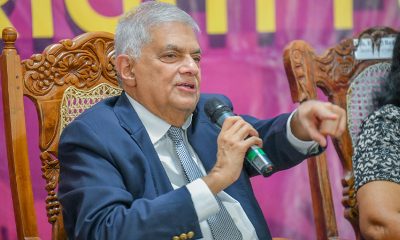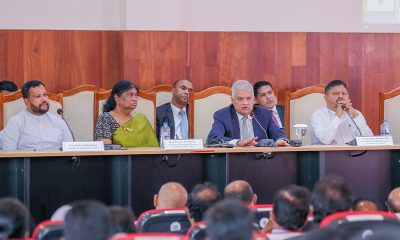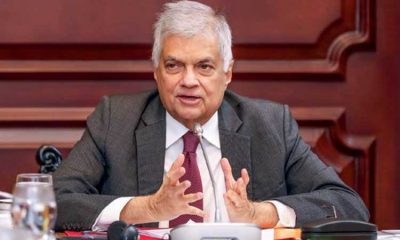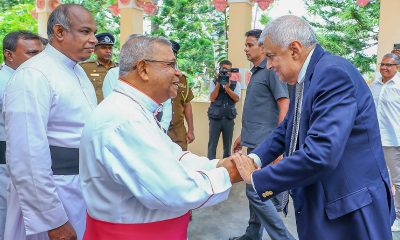Business
“Look beyond borders” president tells LCMA citing the success of the Kandos factory in Petaling Jaya, Malaysia in 1978
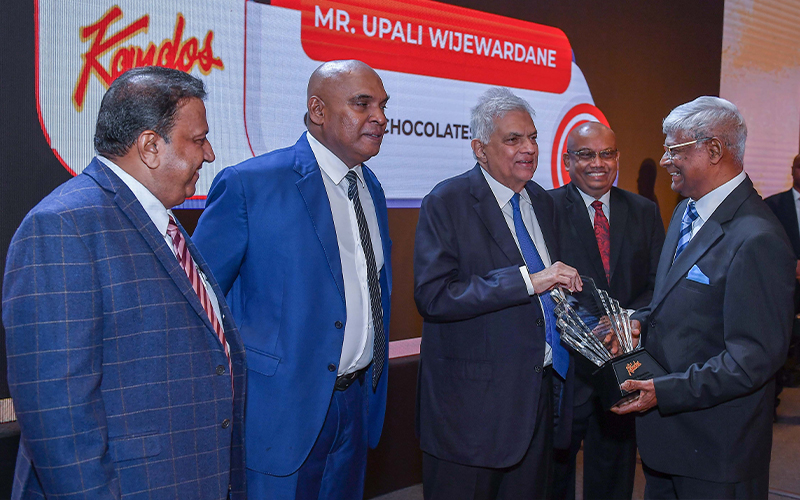
President Ranil Wickremesinghe, addressing the 30th Annual General Meeting of the Lanka Confectionary Manufacturers Association (LCMA) yesterday (24) at Cinnamon Grand Hotel, Colombo emphasized the potential for Sri Lanka to become a global player in the confectionery industry. He encouraged Sri Lankan confectioners to expand their horizons and tap into international markets.
The President emphasized the significance of positioning Sri Lankan chocolates as a world-class product, similar to the renowned reputation of the country’s tea and cinnamon. His encouragement aimed to inspire the confectionery industry to embark on a journey towards global recognition and market presence.
Reflecting on the industry’s history, the President praised the pioneers and highlighted the growth and resilience of the vibrant confectionery sector. He expressed optimism about the potential for Sri Lankan chocolates to become globally recognized. The President urged the confectioners to explore new markets and export their products. He further noted the limitations for expansion within the country and suggested looking beyond borders, citing the success of the Kandos factory in Petaling Jaya, Malaysia in 1978.
Addressing economic challenges, President Wickremesinghe acknowledged the ongoing negotiations for an additional 20 years to address the economic crisis. However, he stressed the need for a sustainable solution and highlighted the importance of export-oriented strategies to overcome financial hurdles. He advocated for increased exports and identified the confectionery industry, particularly chocolates, as having the potential for international recognition.
President Wickremesinghe encouraged the confectionery industry to explore inter-cropping with cocoa, citing state plantations in Matale, Kandy, Mawathagama, and Dodangaslanda for potential expansion. He mentioned plans to collaborate with smallholders and discussions with the governments of Ghana and Ivory Coast for access to cocoa.
The President outlined broader initiatives, including leasing state-owned plantations to Sri Lankan companies or Sri Lankan companies with foreign shareholders for the development of the food industry, encompassing confectionery. Virtually all the lands owned by Chilaw and Kurunegala plantation plus Elkaduwa with JEDB and SPC. He disclosed plans for modernizing agriculture, enhancing competitiveness through the National Productivity Commission and upgrading trade agreements with India and Thailand.
President Wickremesinghe pledged government support, including Rs. 8 billion for research and development, to foster a thriving confectionery industry urging collaboration, innovation and expansion into various areas of the food industry positioning it as a “low hanging fruit” for economic growth.
Acknowledging the substantial contributions of pioneering founders and manufacturers in the confectionery industry to the development of the Sri Lankan economy, President Wickremesinghe presented awards to esteemed individuals. Recipients of these awards included Mr. Hinni Appuhamy, Founder of Maliban Group; Mr. Arthur Von. Possner, Founder of Ceylon Cold Stores (Elephant House); Mr. Junius Motha, Founder of Motha; Deshamanya Mineka Wickremesinghe, Founder of Munchee; Mr. P.J.C Perera, Founder of Uswatte Group; Mr. Sinnasamy Muttiah, Founder of Luckyland; Mr. Upali Wijewardhena, Founder of Kandos, and Mr. Vidanage John Appuhami, Founder of Cherish.
Additionally, Chairman of the LCMA, Dr. Samitha Prerera, presented a special memento to the President.
During the event, Dr Samitha Perera expressed gratitude for President Wickremesinghe’s substantial efforts in the economic recovery of Sri Lanka. He acknowledged the President’s presence as a source of courage and strength for the industry’s advancement. Mr. Perera appreciated the President’s endeavours to uplift the nation and emphasized the industry’s alignment with those efforts. Recognizing the challenges faced amid a tough macroeconomic environment, he affirmed the organization’s solidarity with the President. Mr. Perera underscored the pivotal role of increasing the country’s dollar income for sustaining current benefits.
Minister of Industrial and Health, Dr. Ramesh Pathirana, accompanied by Secretary to the Ministry of Finance, Mahinda Siriwardena, Senior Advisor to the President on Economic Affairs, Dr. R.H.S. Sanarathunga and various officials from LCMA, graced the event.
(PMD)
Business
Sri Lanka betting its tourism future on cold, hard numbers

National Airport Exit Survey tells quite a story
Australia’s role here is strategic, not charitable
In a quiet but significant shift, Sri Lanka’s tourism sector is moving beyond traditional destination marketing and instinct-based planning. The recent launch of the “From Data to Decisions” initiative jointly backed by Australia’s Market Development Facility and the Sri Lanka Tourism Development Authority, sent an unambiguous message: sentiment is out, statistics are in.
The initiative is anchored by a 12-month National Airport Exit Survey, a trove of data covering 16,000 travellers. The findings sketch a new traveller profile: nearly half are young (20–35), independent, and book online. Galle, Ella, and Sigiriya are the hotspots; women travellers outnumber men; and a promising 45% plan to return. This isn’t just trivia. It’s a strategic blueprint. If Sri Lanka Tourism listens, it can tailor everything from infrastructure to marketing, moving from guesswork to precision.
The keynote speaker, Deputy Minister Prof. Ruwan Ranasinghe called data “a vital pillar of tourism transformation.” Yet the unspoken truth is that Sri Lanka has long relied on generic appeals -beaches, heritage, smiles. In today’s crowded market, that’s no longer enough. As SLTDA Chairman Buddhika Hewawasam noted, this partnership is about “elevating how we collect, analyse, and use data.”
Australia’s role here is strategic, not charitable. By funding research and advocating for a Tourism Satellite Account, it is helping Sri Lanka build a tourism sector that is both sustainable and measurable. Australian High Commissioner Matthew Duckworth linked this support to “global standards of environmental protection” – a clear nod to the growing demand for green travel. This isn’t just aid; it’s influence through insight.
“The real test lies ahead,” a tourism expert told The Island. “Data is only as good as the decisions it drives. Will these insights overcome bureaucratic inertia? Will marketing budgets actually follow the evidence toward younger, independent, female travellers?,” he asked.
“The comprehensive report promised for early 2026 must move swiftly from recommendation to action. In an era where destinations are discovered on Instagram and planned with algorithms, intuition alone is a high-stakes gamble. This forum made one thing clear: Sri Lanka is finally building its future on what visitors actually do – not just what we hope they’ll do. The numbers are in. Now, the industry must dare to follow them,” he said.
By Sanath Nanayakkare
Business
New ATA Chair champions Asia’s small tea farmers, unveils ambitious agenda

In his inaugural address as the new Chairman of the Asia Tea Alliance (ATA), Nimal Udugampola placed the region’s millions of smallholders at the core of the global tea industry’s future, asserting they are the “indispensable engine” of a sector that produces over 90% of the world’s tea.
Udugampola, who is also Chairman of Sri Lanka’s Tea Smallholdings Development Authority, used his speech at the 6th ATA Summit held in Colombo on Nov. 27 to declare that the prosperity of Asian tea is “entirely contingent” on the resilience of its small-scale farmers, who have historically been overlooked by premium global markets.
“In Sri Lanka, smallholders account for over 75% of our national production. Across Asia, millions of families maintain the quality and character of our regional teas,” he stated, accepting the chairmanship for the 2025-2027 term.
To empower this vital community, Udugampola unveiled a vision focused on Sustainability, Equity, and Digital Transformation. The strategic agenda includes:
Climate Resilience: Promoting climate-smart agriculture and regenerative farming to protect smallholdings from environmental disruption.
Digital Equity: Leveraging technology like blockchain to create farm-to-cup traceability, connecting smallholders directly with premium consumers and ensuring fair value.
Market Expansion: Driving innovation in tea products and marketing to attract younger consumers and enter non-traditional markets.
Standard Harmonization: Establishing common regional quality and sustainability standards to protect the “Asian Tea” brand and push for stable, fair pricing.
Linking the alliance’s goals to national ambition, Udugampola highlighted Sri Lanka’s target of producing 400 million kilograms of tea by 2030. He presented the country’s “Pivithuru Tea Initiative” as a model for other ATA nations, designed to achieve this through smallholder empowerment, digitalization, and aligned policy objectives.
By Sanath Nanayakkare
Business
Brandix recognised as Green Brand of Year at SLIM Awards 2025
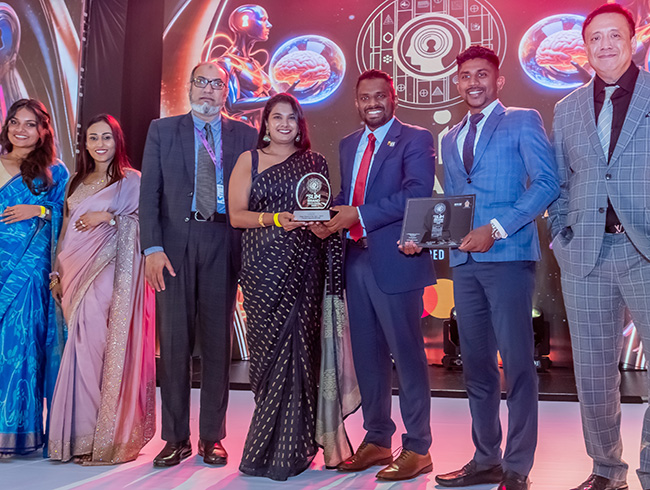
Brandix Apparel Solutions was recognised as the Green Brand of the Year at the Sri Lanka Institute of Marketing (SLIM) Brand Excellence Awards 2025, taking home Silver, the highest award presented in the category this year.
The ‘Green Brand of the Year’ recognises the brand that drives measurable environmental impact through sustainable practices, climate-aligned goals and long-term commitment to protecting natural resources.
A pioneer in responsible apparel manufacturing for over two decades, Brandix has championed best practices in the sphere of sustainable manufacturing covering environmental, social, and governance aspects. The company built the world’s first Net Zero Carbon-certified apparel manufacturing facility (across Scope 1 and Scope 2) and meets over 60% of its energy requirement in Sri Lanka via renewable sources.
Head of ESG at Brandix, Nirmal Perera, said: “Being recognised as Green Brand of the Year is an encouraging milestone for our teams working across sustainability.”
-
News5 days ago
Lunuwila tragedy not caused by those videoing Bell 212: SLAF
-

 News10 hours ago
News10 hours agoOver 35,000 drug offenders nabbed in 36 days
-

 News4 days ago
News4 days agoLevel III landslide early warning continue to be in force in the districts of Kandy, Kegalle, Kurunegala and Matale
-

 Latest News7 days ago
Latest News7 days agoLevel III landslide early warnings issued to the districts of Badulla, Kandy, Kegalle, Kurunegala, Matale and Nuwara-Eliya
-

 Features6 days ago
Features6 days agoDitwah: An unusual cyclone
-

 Business2 days ago
Business2 days agoLOLC Finance Factoring powers business growth
-

 News2 days ago
News2 days agoCPC delegation meets JVP for talks on disaster response
-

 News2 days ago
News2 days agoA 6th Year Accolade: The Eternal Opulence of My Fair Lady


